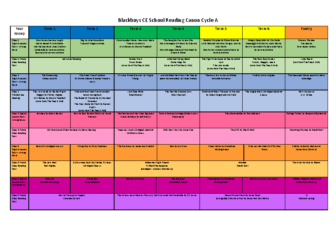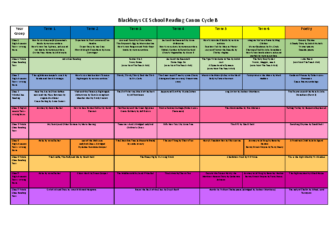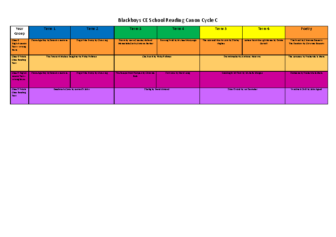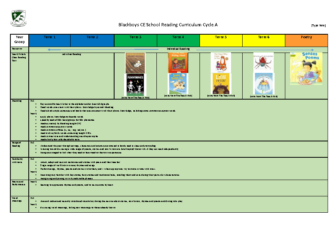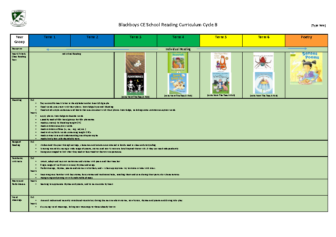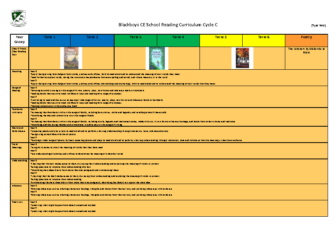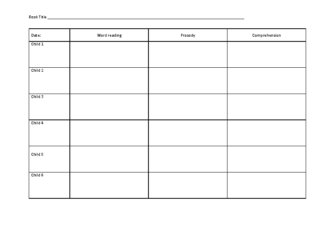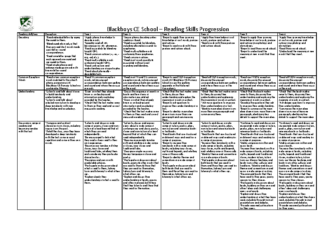Reading Intent
At St Thomas a Becket Federation we recognise the importance of reading as a key life skill. Reading opens doors into all aspects of learning and a secure grounding in the skills of decoding, inference, deduction and fluency is vital for progress in all areas. Pupils are encouraged to read a wide range of texts (both fiction and non-fiction) and to become confident, fluent readers, who enjoy exploring the written word. Our intention is that, by the end of KS2, each child will be able to read fluently, for pleasure and have the skills that will support their learning across the curriculum and into the next phase of their education.
We will follow the National Curriculum for English by teaching pupils to:
- Read fluently and with good understanding.
- Develop the habit of reading widely and often, for both pleasure and information.
- Acquire a wide vocabulary, an understanding of grammar and knowledge of linguistic conventions for Reading.
- Appreciate our rich and varied literary heritage.
- Use discussion in order to elaborate and explain clearly their understanding and ideas.
Implementation
The key to learning to read is through quality Phonics teaching. At Blackboys CE School we use the Monster Phonics programme which covers all areas of the Phonics curriculum. Alongside this, our children are introduced to reading through the use of phonically decodable books that match the phonemes that they have been learning in class. The children are taught Phonics in single year groups and there is flexibility within those groupings to support individual children’s needs.
In all classes, children will be exposed to books within their English lessons as we take a text-based approach to our writing curriculum. These books will produce the content needed for our sentence of the week initiative, where the children are encouraged to read a selected sentence and look at how parts of the sentence can be changed and what this does to the meaning of the sentence.
In EYFS and KS1, the children take part in Guided Reading 4 times a week. The first session of the week focuses on Reading for Pleasure with the children sharing picture books and then taking these home to share with their families. The other three sessions focus on word reading, prosody and comprehension skills, ensuring that each child has read their Monster Phonics book 3 times before they take it home to practise. The aim is for the children to be 90% fluent at reading these books before they take them home.
All classes will end the day with a class novel, which will be chosen by the class teacher and is used as a chance to promote reading for pleasure.
All children from Reception to Year 6 take books home to read and are encouraged to read each day for 10-15 minutes. This reading is recorded in their home reading record and when these records are full, the child will receive a certificate at school.
From Year 1 onwards, each class will engage with Whole Class Reading. In KS1 this begins with using picture books that have been re-written into decodable text and can be accessed through modelling and echoing. By the end of KS1, the classes will be reading longer chapter books, following our Reading Canon.
During Whole Class Reading sessions, teachers will make use of the following skills:
- Echo reading
- Choral reading
- Paired reading
- Modelling how to read fluently
- Modelling thinking aloud the comprehension of a text
- Activating and using background knowledge
- Generating and asking questions
- Making predictions
- Visualising
- Summarising
- Developing vocabulary
Teachers will use comprehension questions as a tool to assess how well the children have understood a section of the text. The questions will be text specific, allowing all children to access them.
Children have the opportunity for regular 1:2:1 reading with an adult, either by reading to a teacher or TA or to a volunteer. This reading is recorded in a reading record, allowing the class teacher to address any issues that become apparent. Volunteer readers are for children to develop their fluency and automaticity and therefore the children will often be reading familiar texts.
For those children who find learning to read harder, there are many things that we can do. If the difficulty is with using and applying phonics knowledge, the children will have short 1:2:1 intervention sessions to fill gaps in understanding. Day to day keep up interventions take the form of pre-teaching content for children that we expect to find it difficult.
If children are struggling to understand what they are reading teachers will scaffold the questions to enable all to succeed. Some children in KS2 will have extra intervention sessions in a small group with a teacher to practise these skills.
Impact
The impact of Reading can be seen through the National Tests at the end of KS2. To support this and to allow us to have the agility to adapt our planning and our teaching, all children from Year 1 – 6 take standardised tests in reading at the end of terms 2, 4 and 6.
Through our systematic phonics programme, our aim is that all children will be able to read fluently by the end of KS1. We make regular use of formative and summative assessments to make sure that the phonics teaching is relevant to the needs of the group.
Through our varied diet of reading in school, our children will become confident readers with the necessary skills to enjoy reading for pleasure, finding information and will be able to access wider areas of the curriculum.

